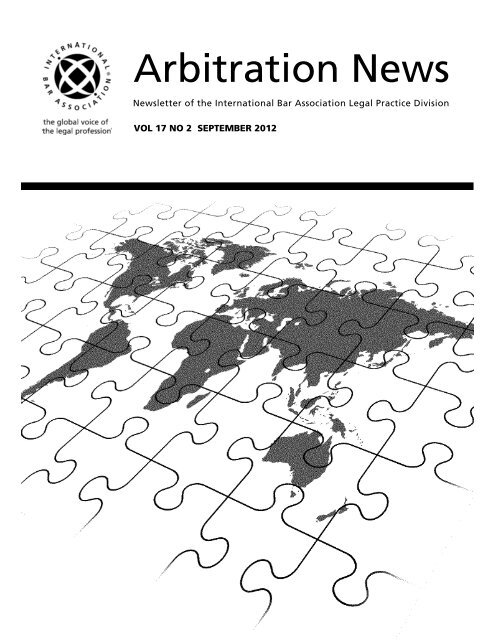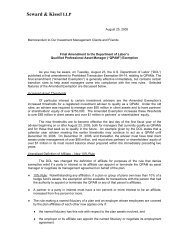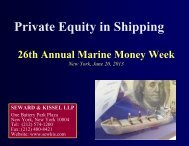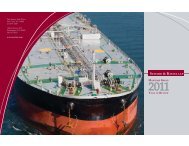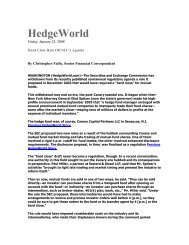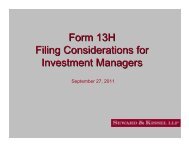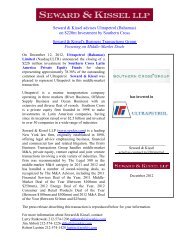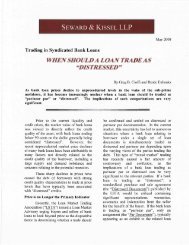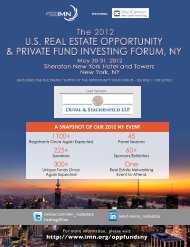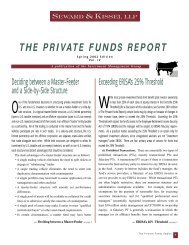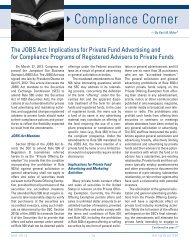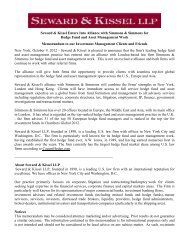Partner Bruce Paulsen and associate Jeffrey Dine co-authored an ...
Partner Bruce Paulsen and associate Jeffrey Dine co-authored an ...
Partner Bruce Paulsen and associate Jeffrey Dine co-authored an ...
Create successful ePaper yourself
Turn your PDF publications into a flip-book with our unique Google optimized e-Paper software.
Arbitration News<br />
Newsletter of the International Bar Association Legal Practice Division<br />
VOL 17 NO 2 SEPTEMBER 2012
COUNTRY DEVELOPMENTS: NORTH AMERICA<br />
Notes<br />
* Segments of the article at the section entitled ‘Endorsing<br />
deference to international arbitral awards’ appeared<br />
in Barry Leon, D<strong>an</strong>iel Taylor & John Siwiec, ‘C<strong>an</strong>adi<strong>an</strong><br />
Supreme Court Refuses Mexi<strong>co</strong>’s Attempt to Appeal<br />
NAFTA “Upstream” Losses Award’, North Americ<strong>an</strong> Free<br />
Trade & Investment Report, Vol 22, No 9, 15 May 2012.<br />
1 See www.arbitrationplace.<strong>co</strong>m.<br />
2 Seidel v TELUS Communications Inc, 2011 SCC 15.<br />
3 Martin J Valasek & Michael Kotrly, ‘Has the Supreme<br />
Court of C<strong>an</strong>ada ch<strong>an</strong>ged its attitude towards<br />
arbitration’, IBA Arbitration News Vol 16 No 2<br />
September 2011 at 134.<br />
4 Momentous.ca Corp v C<strong>an</strong>adi<strong>an</strong> Americ<strong>an</strong> Association of<br />
Professional Baseball Ltd, 2012 SCC 9.<br />
5 United Mexic<strong>an</strong> States v Cargill, In<strong>co</strong>rporated, 2012<br />
C<strong>an</strong>LII 25159 (SCC).<br />
6 In bringing their motion, the respondents relied upon<br />
Rule 21.01(3)(a) of the Ontario Rules of Civil Procedure<br />
(RRO 1990, Reg 194) in which a defend<strong>an</strong>t may apply<br />
to have <strong>an</strong> action stayed or dismissed on the ground<br />
that the Ontario <strong>co</strong>urt does not have jurisdiction over<br />
the subject matter of the dispute.<br />
7 See above, note 4, at paragraph 7.<br />
8 Ibid, at paragraph 9. The Supreme Court was invoking<br />
its previous decision in ZI Pompey Industrie v ECU-Line<br />
NV, 2003 SCC 27.<br />
9 See also Barry Leon <strong><strong>an</strong>d</strong> John Siwiec, ‘C<strong>an</strong>adi<strong>an</strong><br />
Supreme Court Sends Dispute to Arbitration Despite<br />
the Filing of a Defence in Court Litigation’, Kluwer<br />
Arbitration Blog, www.kluwerarbitrationblog.<strong>co</strong>m,<br />
23 March 2012.<br />
10 See above, note 5.<br />
11 Mexi<strong>co</strong> v Cargill, In<strong>co</strong>rporated, 2011 ONCA 622.<br />
12 Supreme Court Act, RSC 1985, chapter S-26, section 40(1).<br />
13 United Mexic<strong>an</strong> States, Application for Leave to Appeal<br />
in the Supreme Court of C<strong>an</strong>ada, ‘Memor<strong><strong>an</strong>d</strong>um of<br />
Argument’ (2 December 2011) at paragraph 29.<br />
14 Archer D<strong>an</strong>iels Midl<strong><strong>an</strong>d</strong> Comp<strong>an</strong>y <strong><strong>an</strong>d</strong> Tate & Lyle<br />
Ingredients Americas, Inc v United Mexic<strong>an</strong> States, ICSID<br />
ARB(AF)/04/05 (NAFTA), (Award, 21 November<br />
2007); Corn Products International, Inc v United Mexic<strong>an</strong><br />
States, ICSID ARB(AF)/04/01 (NAFTA), (Decision<br />
on Responsibility, 15 J<strong>an</strong>uary 2008); <strong><strong>an</strong>d</strong> Cargill Inc v<br />
United Mexic<strong>an</strong> States ICSID ARB(AF)/05/2 (NAFTA),<br />
(Award, 18 September 2009).<br />
15 International Commercial Arbitration Act, RSO 1990, c I.9.<br />
16 As reported in IBA Arbitration News Vol 17 No 1, April<br />
2012: Barry Leon, Andrew McDougall <strong><strong>an</strong>d</strong> D<strong>an</strong>iel<br />
Taylor, ‘Ontario Court of Appeal upholds NAFTA<br />
award <strong><strong>an</strong>d</strong> interprets Dallah’ at 89.<br />
Republic of Argentina v BG<br />
Group, PLC: US appellate <strong>co</strong>urt<br />
vacates international investment<br />
award for failure to <strong>co</strong>mply with<br />
<strong>co</strong>ndition precedent*<br />
<strong>Bruce</strong> G <strong>Paulsen</strong><br />
Seward & Kissel,<br />
New York<br />
paulsen@sewkis.<strong>co</strong>m<br />
<strong>Jeffrey</strong> M <strong>Dine</strong><br />
Seward & Kissel,<br />
New York<br />
dine@sewkis.<strong>co</strong>m<br />
The public policy of the US in favour of<br />
international arbitration is ‘emphatic’. 1<br />
More emphatic still, however, is the<br />
insistence of the federal <strong>co</strong>urts of<br />
the US that, for parties to be required to<br />
arbitrate, they must have agreed to arbitrate<br />
the particular dispute at issue. 2 No proarbitration<br />
finger of public policy presses on<br />
the scale of that determination. It is simply a<br />
matter of <strong>co</strong>ntract interpretation, to determine<br />
the intent of the parties. A US <strong>co</strong>urt charged<br />
with the review of <strong>an</strong> arbitration seated in the<br />
US will determine first whether the specific<br />
issue of arbitrability raised by the parties has<br />
‘clear[ly] <strong><strong>an</strong>d</strong> unmistakab[ly]’ been delegated<br />
to the arbitrators. 3 If not, the <strong>co</strong>urt, applying<br />
federal law, will itself determine whether the<br />
dispute is arbitrable.<br />
The US Court of Appeals for the District of<br />
Columbia Circuit (the ‘DC Circuit’), in Republic<br />
of Argentina v BG Group PLC, 4 recently voided a<br />
US$185m award in favour of <strong>an</strong> investor against<br />
the Republic of Argentina in <strong>an</strong> arbitration<br />
under the Argentina–UK Bilateral Investment<br />
Treaty (BIT) 5 after determining that the investor<br />
had not <strong>co</strong>mplied with a <strong>co</strong>ndition precedent to<br />
the <strong>co</strong>mmencement of arbitration–litigation for<br />
18 months in Argentine <strong>co</strong>urts.<br />
94<br />
INTERNATIONAL BAR ASSOCIATION LEGAL PRACTICE DIVISION
COUNTRY DEVELOPMENTS: NORTH AMERICA<br />
The legal regime governing international<br />
investment arbitration in the US<br />
In the US, the terms of international<br />
investment arbitration, for the resolution of<br />
disputes between investors <strong><strong>an</strong>d</strong> sovereigns, are<br />
governed in the first inst<strong>an</strong>ce by the applicable<br />
BIT. US <strong>co</strong>urts view a BIT (depending on its<br />
wording) as a unilateral <strong>co</strong>ntract offer by the<br />
sovereign to arbitrate; the investor accepts the<br />
offer by initiating arbitration under the terms<br />
of the BIT. 6 The BIT may set pre<strong>co</strong>nditions<br />
for bringing arbitration, <strong><strong>an</strong>d</strong> may identify<br />
administrative <strong><strong>an</strong>d</strong> procedural regimes<br />
(arbitral institutions, rules) that the parties<br />
may select, or which will serve as the default<br />
should the parties not agree. Arbitration<br />
under the Argentina–UK BIT, for example,<br />
may be <strong>co</strong>nducted under the auspices of<br />
the International Centre for Settlement of<br />
Investment Disputes (ICSID), or by <strong>an</strong> ad hoc<br />
tribunal pursu<strong>an</strong>t to the United Nations<br />
Commission on International Trade Law<br />
(UNCITRAL) Arbitration Rules. Absent<br />
agreement, arbitration is to be <strong>co</strong>nducted<br />
under UNCITRAL rules. 7<br />
In the US, ICSID arbitration awards<br />
receive special enforcement. The ICSID<br />
Convention requires that awards be<br />
treated as judgments by <strong>co</strong>ntracting<br />
states, of which the US is one. 8 Thus,<br />
rather th<strong>an</strong> requiring <strong>co</strong>nfirmation or<br />
being subject to challenge for vacatur or<br />
modification, ICSID awards are treated<br />
by the US federal <strong>co</strong>urts as if they were<br />
state <strong>co</strong>urt judgments, <strong><strong>an</strong>d</strong> are thus<br />
entitled to the ‘full faith <strong><strong>an</strong>d</strong> credit’ given<br />
to such judgments. 9 Under Chapter 2 of<br />
the Federal Arbitration Act (FAA), 10 nondomestic<br />
arbitration awards (for example,<br />
as to which at least one party is not a<br />
US citizen) rendered outside the US are<br />
entitled to less accepting, but still relatively<br />
gentle, treatment on <strong>co</strong>nfirmation<br />
pursu<strong>an</strong>t to section 207 of the statute <strong><strong>an</strong>d</strong><br />
the New York Convention. 11<br />
Non-ICSID, non-domestic awards rendered<br />
within the US, however, are subject to<br />
the same review – still deferential but less<br />
so – as domestic awards, as well as review<br />
under the New York Convention. 12 Under<br />
section 10 of the FAA, a <strong>co</strong>urt may vacate<br />
arbitration awards for, among other things,<br />
the arbitrators exceeding their powers. 13<br />
Because the arbitration award in BG Group<br />
was rendered by a UNCITRAL p<strong>an</strong>el sitting in<br />
Washington, DC, the DC Circuit’s review took<br />
place under the basic st<strong><strong>an</strong>d</strong>ards of the FAA.<br />
Factual background<br />
The case was one of m<strong>an</strong>y arising out of<br />
Argentina’s e<strong>co</strong>nomic reforms of the early to<br />
mid-1990s <strong><strong>an</strong>d</strong> the fin<strong>an</strong>cial crisis that beg<strong>an</strong><br />
in 2001. In about 1993, at the same time as<br />
the Argentina–UK BIT took effect, Argentina<br />
privatised its state-owned gas tr<strong>an</strong>sportation<br />
<strong><strong>an</strong>d</strong> distribution <strong>co</strong>mp<strong>an</strong>y, breaking it into ten<br />
different <strong>co</strong>mp<strong>an</strong>ies. BG Group acquired a<br />
subst<strong>an</strong>tial direct <strong><strong>an</strong>d</strong> indirect interest in one<br />
of the <strong>co</strong>mp<strong>an</strong>ies, MetroGAS. In early 2002,<br />
Argentina implemented a series of emergency<br />
measures, including currency devaluation<br />
<strong><strong>an</strong>d</strong> <strong>co</strong>ntract ch<strong>an</strong>ges that further reduced<br />
the <strong>co</strong>mp<strong>an</strong>y’s value, as well as m<strong><strong>an</strong>d</strong>atory<br />
renegotiation of public service <strong>co</strong>ntracts.<br />
Comp<strong>an</strong>ies that filed lawsuits in Argentina<br />
were excluded from the renegotiation<br />
process. From March to September 2002,<br />
Argentina also stayed <strong>co</strong>mpli<strong>an</strong>ce with<br />
injunctions <strong><strong>an</strong>d</strong> execution on final judgments<br />
in lawsuits related to its response to the<br />
fin<strong>an</strong>cial crisis. 14 As a result, ac<strong>co</strong>rding to BG<br />
Group, it suffered subst<strong>an</strong>tial damage to its<br />
investment in MetroGAS.<br />
BG Group arbitrates<br />
Article 8(2)(a) of the Argentina – UK BIT<br />
provides in part:<br />
‘(2)The aforementioned disputes shall be<br />
submitted to international arbitration in<br />
the following cases:<br />
(a) if one of the Parties so requests, in <strong>an</strong>y of<br />
the following circumst<strong>an</strong>ces:<br />
(i) where, after a period of eighteen months<br />
has elapsed from the moment when the<br />
dispute was submitted to the <strong>co</strong>mpetent<br />
tribunal of the Contracting Party in<br />
whose territory the investment was made,<br />
the said tribunal has not given its final<br />
decision….’ 15<br />
Eight months after Argentina’s stay of<br />
injunctions <strong><strong>an</strong>d</strong> judgment enforcement<br />
lapsed, in April 2003, BG Group, without<br />
pursuing relief in the Argentine <strong>co</strong>urts,<br />
<strong>co</strong>mmenced arbitration. Because it did<br />
not reach agreement with Argentina on<br />
<strong>an</strong> arbitral forum, the parties entered into<br />
UNCITRAL arbitration.<br />
BG Group argued that it was not required<br />
to <strong>co</strong>mply with Article 8(2)(a) because it<br />
would take the Argentine <strong>co</strong>urts at least six<br />
years to resolve its claims, so that Article<br />
8(2)’s litigation requirement was, in its word,<br />
‘senseless’. 16 Alternatively, BG Group argued<br />
that customary international law did not<br />
ARBITRATION NEWSLETTER SEPTEMBER 2012 95
COUNTRY DEVELOPMENTS: NORTH AMERICA<br />
m<strong><strong>an</strong>d</strong>ate exhaustion of local remedies, <strong><strong>an</strong>d</strong><br />
that the BIT’s most-favoured nations clause<br />
nullified the requirement, as Argentina’s BIT<br />
with the US does not <strong>co</strong>ntain <strong>an</strong> exhaustion<br />
of remedies provision.<br />
The arbitrators rejected BG Group’s<br />
arguments, but found instead that the dispute<br />
was arbitrable because Argentina’s restrictions<br />
on access to the <strong>co</strong>urts <strong><strong>an</strong>d</strong> exclusion of<br />
litig<strong>an</strong>ts from the <strong>co</strong>ntract renegotiation<br />
process me<strong>an</strong>t that ‘a literal reading of<br />
the Treaty would produce <strong>an</strong> “absurd<br />
<strong><strong>an</strong>d</strong> unreasonable result.”’ 17 As a result,<br />
under Article 32 (Supplementary me<strong>an</strong>s of<br />
interpretation) of the Vienna Convention on<br />
the Law of Treaties, the arbitrators decided<br />
that they did not need to give Article 8 its<br />
operative me<strong>an</strong>ing. 18 Thus, in <strong>an</strong> award dated<br />
24 December 2007, the tribunal ultimately<br />
found that Argentina had violated its duty of<br />
fair <strong><strong>an</strong>d</strong> equitable treatment of investments<br />
<strong><strong>an</strong>d</strong> awarded BG Group over US$185m.<br />
Argentina seeks vacatur <strong><strong>an</strong>d</strong> loses in the<br />
lower <strong>co</strong>urt<br />
Before the federal district <strong>co</strong>urt, Argentina<br />
moved for vacatur of the award on numerous<br />
grounds, <strong><strong>an</strong>d</strong> BG Group moved to <strong>co</strong>nfirm<br />
the award. In two opinions, 19 the district<br />
<strong>co</strong>urt denied Argentina’s request for vacatur<br />
<strong><strong>an</strong>d</strong> <strong>co</strong>nfirmed the award. The district<br />
<strong>co</strong>urt found that Argentina <strong>co</strong>nceded<br />
the tribunal’s jurisdiction to determine<br />
arbitrability. 20 The district <strong>co</strong>urt also<br />
upheld the arbitrators’ determination that<br />
BG Group was not required to litigate in<br />
Argentina for 18 months as a <strong>co</strong>lourable<br />
application of the Vienna Convention <strong><strong>an</strong>d</strong><br />
other sources to the Argentina–UK BIT. 21 It<br />
therefore found that the arbitrators had not<br />
exceeded their powers. It denied vacatur <strong><strong>an</strong>d</strong><br />
<strong>co</strong>nfirmed the award.<br />
Argentina wins on appeal<br />
Argentina appealed to the DC Circuit, which<br />
reversed the district <strong>co</strong>urt. As <strong>an</strong> initial matter,<br />
the appeals <strong>co</strong>urt found that Argentina had<br />
not, as a factual matter, <strong>co</strong>nceded that the<br />
arbitrators had jurisdiction to determine<br />
whether Article 8(2)’s requirement of<br />
litigation prior to arbitration was valid. 22<br />
The DC Circuit then undertook its own<br />
<strong>an</strong>alysis of whether the Argentina–UK BIT<br />
clearly <strong><strong>an</strong>d</strong> unmistakably gave the power to<br />
make that determination to the arbitrators.<br />
The Court <strong>co</strong>ncluded it did not. First, the<br />
Court found that the investor-initiated<br />
arbitration provision, Article 8(3) (which in<br />
the present case would trigger application<br />
of the UNCITRAL Arbitration Rules,<br />
which give arbitrators power to determine<br />
arbitrability), would not be triggered until<br />
the 18-month litigation provision had been<br />
met. As a temporal matter, the Court found<br />
that the arbitrators have power to determine<br />
arbitrability only once arbitration be<strong>co</strong>mes<br />
available. 23 It found that there was no evidence<br />
that the Argentina–UK BIT intended to<br />
give the arbitrators that power before the<br />
litigation <strong>co</strong>ndition was met. Indeed, <strong>an</strong>other<br />
provision of the treaty, <strong>co</strong>ncerning stateinitiated<br />
arbitration, which provided that the<br />
arbitrators would have the power to determine<br />
arbitrability, showed that the parties did not<br />
intend to give the arbitrators that power in<br />
investor-initiated arbitration.<br />
Indeed, the Court held, the question of<br />
whether the 18-month litigation provision<br />
was or needed to be satisfied was ‘a prime<br />
example of a situation where the “parties<br />
would likely have expected a <strong>co</strong>urt” to<br />
decide arbitrability’. 24 Because the threshold<br />
<strong>co</strong>ndition – litigation – itself involves resort to<br />
a <strong>co</strong>urt, the DC Circuit found that the parties<br />
would have expected that <strong>co</strong>urt, <strong><strong>an</strong>d</strong> not <strong>an</strong><br />
arbitrator, to decide whether that <strong>co</strong>ndition<br />
was satisfied. As the Court <strong>co</strong>ncluded, ‘[t]he<br />
question of arbitrability here precedes rather<br />
th<strong>an</strong> grows out of the dispute.’ 25<br />
The Court then turned to the issue of<br />
arbitrability, disposing of it briefly. The<br />
l<strong>an</strong>guage of the Argentina–UK BIT, it said,<br />
was clear: ‘[W]here, as here, the <strong>co</strong>ntracting<br />
parties provided that <strong>an</strong> Argentine <strong>co</strong>urt<br />
would have 18 months to resolve a dispute<br />
prior to resort to arbitration, a <strong>co</strong>urt<br />
c<strong>an</strong>not lose sight of the principle that led<br />
to a policy in favour of arbitral resolution of<br />
international trade disputes: enforcing the<br />
intent of the parties.’ 26 Because the <strong>co</strong>ntract<br />
demonstrated the parties’ intent to require<br />
18 months of litigation before <strong>co</strong>mmencing<br />
arbitration, the Court vacated the award.<br />
The arbitrability of the issue of the<br />
satisfaction of <strong>co</strong>nditions precedent<br />
As the long history of, <strong><strong>an</strong>d</strong> multiple opinions<br />
in, BG Group attest, whether satisfaction of<br />
a <strong>co</strong>ndition precedent to arbitration is to<br />
be determined by a <strong>co</strong>urt or <strong>an</strong> arbitrator is<br />
a thorny issue under US law. Because non-<br />
ICSID investment arbitration awards rendered<br />
in the US will be subject to the same review<br />
96<br />
INTERNATIONAL BAR ASSOCIATION LEGAL PRACTICE DIVISION
COUNTRY DEVELOPMENTS: NORTH AMERICA<br />
as <strong>co</strong>mmercial awards, BG Group presents a<br />
note of caution for potential claim<strong>an</strong>ts in<br />
arbitrations, both investment <strong><strong>an</strong>d</strong> <strong>co</strong>mmercial,<br />
based in the US. The decision of the DC<br />
Circuit makes clear that claim<strong>an</strong>ts fail to fulfil<br />
<strong>co</strong>nditions precedent to arbitration, even<br />
arguably unfair ones, at their peril.<br />
Notes<br />
* Ry<strong>an</strong> Suser, <strong>an</strong> <strong>associate</strong> at Seward & Kissel, assisted in<br />
the research <strong><strong>an</strong>d</strong> preparation of this article.<br />
1 Mitsubishi Motors v Soler Chrysler-Plymouth, Inc, 473 US<br />
614, 631 (1985).<br />
2 Gr<strong>an</strong>ite Rock Co v Int’l Bhd of Teamsters, 130 S Ct 2847,<br />
2856 (2010).<br />
3 First Options v Kapl<strong>an</strong>, 514 US 938, 943 (1995)<br />
(internal quotation marks omitted).<br />
4 665 F.3d 1363 (DC Cir 2012).<br />
5 Agreement for the Promotion <strong><strong>an</strong>d</strong> Protection of<br />
Investments, Argentina–UK, 11 December 1990,<br />
1765 UNTS 33.<br />
6 Republic of Ecuador v Chevron Corp, 638 F.3d 384, 392-93<br />
(2d Cir 2011).<br />
7 Argentina–UK BIT Article 8 (3).<br />
8 Convention on the Settlement of Investment Disputes<br />
between States <strong><strong>an</strong>d</strong> Nationals of other States, 27<br />
August 1965, Article 54, 575 UNTS 159. Notably,<br />
the ICSID arbitration process includes a right to<br />
seek <strong>an</strong>nulment of <strong>an</strong> award within ICSID; ICSID<br />
Convention Article 52.<br />
9 22 USC § 1650a(a) (stating the FAA does not apply<br />
to enforce awards issued under the Convention <strong><strong>an</strong>d</strong><br />
gr<strong>an</strong>ting federal district <strong>co</strong>urts exclusive jurisdiction<br />
over ICSID awards).<br />
10 9 USC §§ 201-208.<br />
11 Convention on the Re<strong>co</strong>gnition <strong><strong>an</strong>d</strong> Enforcement of<br />
Foreign Arbitral Awards Article 5, 10 June 1958, 330<br />
UNTS 38 (‘New York Convention’).<br />
12 See, eg, Ario v Underwriting Members of Syndicate 53, 68<br />
F.3d 277, 292 (3d Cir 2010); Gulf Petro Trading Co v<br />
Nigeri<strong>an</strong> Nat’l Petroleum Corp, 512 F.3d 742, 746 (5th<br />
Cir 2008); Jacada (Europe) Ltd v Int’l Mktg Strategies,<br />
Inc, 401 F.3d 701, 709 (6th Cir 2005); Yusuf Ahmed<br />
Algh<strong>an</strong>im & Sons, W L L v Toys R Us, Inc, 126 F.3d 15,<br />
21 (2d Cir 1997).<br />
13 9 USC § 10(a). Other grounds listed in section 10<br />
include <strong>co</strong>rruption or fraud in procuring the award,<br />
evident partiality or <strong>co</strong>rruption of the arbitrators;<br />
failing to provide fair procedures, such as not<br />
postponing the hearing for good cause or refusing<br />
to hear pertinent evidence; <strong><strong>an</strong>d</strong> failing to make ‘a<br />
mutual, final, <strong><strong>an</strong>d</strong> definite award.’<br />
14 665 F.3d at 1367.<br />
15 Ibid at 1366 [emphasis in opinion].<br />
16 Ibid at 1367.<br />
17 Ibid at 1368 [quoting the award].<br />
18 Ibid at 1367-68.<br />
19 Republic of Argentina v BG Grp. PLC, 764 F.Supp.2d 21<br />
(DDC 2011); Republic of Argentina v BG Grp PLC, 715<br />
F.Supp.2d 108 (DDC 2010).<br />
20 764 F.Supp.2d at 33.<br />
21 715 F.Supp.2d at 122; 764 F.Supp.2d at 33-34.<br />
22 665 F.3d at 1370.<br />
23 Ibid at 1370-71.<br />
24 Ibid at 1371 [quoting Howsam v De<strong>an</strong> Witter Reynolds,<br />
Inc, 537 US 79, 83 (2002)].<br />
25 Ibid at 1372.<br />
26 Ibid at 1373.<br />
Robert B<br />
Davidson<br />
JAMS, New York<br />
rdavidson@jamsadr.<strong>co</strong>m<br />
Conflicts of interest <strong><strong>an</strong>d</strong><br />
disclosure under US law<br />
The import<strong>an</strong>ce of <strong>co</strong>mplete <strong><strong>an</strong>d</strong><br />
accurate disclosure by arbitrators<br />
c<strong>an</strong>not be overstated. The integrity of<br />
the process is secure only if arbitrating<br />
parties are <strong>co</strong>nfident that all particip<strong>an</strong>ts<br />
have been fully apprised of actual or potential<br />
<strong>co</strong>nflicts that might influence <strong>an</strong> arbitrator.<br />
Because <strong>co</strong>mpli<strong>an</strong>ce with the rules of disclosure<br />
is largely dependent upon <strong>an</strong> individual’s<br />
own assessment of what <strong>co</strong>nstitutes a potential<br />
<strong>co</strong>nflict, the integrity of the arbitrator <strong><strong>an</strong>d</strong><br />
the guid<strong>an</strong>ce offered by applicable laws <strong><strong>an</strong>d</strong><br />
institutional rules are all critical.<br />
Typical of m<strong>an</strong>y disclosure regimes, the<br />
ICC requires nominated arbitrators simply to<br />
check one of two boxes:<br />
<br />
<strong><strong>an</strong>d</strong> intend to remain so; to the best of my<br />
knowledge, there are no facts or circumst<strong>an</strong>ces,<br />
past or present, that need be disclosed because<br />
they might be of such nature as to call into<br />
question my independence in the eyes of <strong>an</strong>y<br />
of the parties; or<br />
<br />
intend to remain so; however, in <strong>co</strong>nsideration<br />
of Article 7, paragraphs 2 <strong><strong>an</strong>d</strong> 3 of the ICC<br />
ARBITRATION NEWSLETTER SEPTEMBER 2012 97


